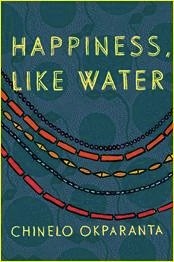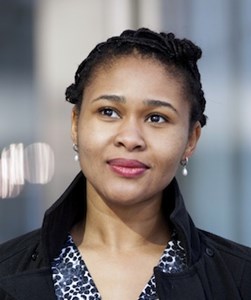Source: Southern New Hampshire University MFA and Creative Writing
Great Artistry Brought to Bear: Chinelo Okparanta is short-listed for the Etisalat Prize as she joins the faculty of Southern New Hampshire University's MFA in Fiction and Nonfiction program.
MANCHESTER, NH, Jan. 28, 2015 (GLOBE NEWSWIRE) -- Chinelo Okparanta arrived with an impressive new credential when she joined the faculty of Southern New Hampshire University's Low-Residency MFA in Fiction and Nonfiction program earlier this month. Her debut collection of short stories, "Happiness, Like Water," had just been named to the short list of nominees for the Etisalat Prize in Literature.
This is also a reminder of the hold that Nigeria continues to exert upon a young writer who came with her family to America (her father was ill and needed better health care) at the age of ten. The Etisalat Prize, established in 2013, is a prestigious pan-African prize recognizing the best first books by new African writers.
But Okparanta is also a heralded new American writer, educated at Pennsylvania State University, Rutgers University, and the Iowa Writers' Workshop. Her essays and short stories have appeared in The New Yorker, Granta, Tin House, The Kenyon Review, AGNI, and TriQuarterly.
And this first story collection has already collected a raft of honors: long-listed for the 2013 Frank O'Connor Short Story Award, short-listed for the New York Public Library Young Lions Fiction Award, a finalist for the 2013 Caine Prize for African Writing, and winner of the 2014 Lambda Literary Award for Lesbian Fiction. Both The Guardian and The New York Times listed "Happiness, Like Water" among their best books of the year.
"The stories in Chinelo Okparanta's first collection are quiet, often unnervingly so, in the manner of a stifled shriek," said The New York Times in its review of the book. Sometimes these shrieks are raised against the gender roles built into Nigeria's tribal cultures, and into the lives today of its city-dwellers and expatriates.
But more often they have to do with the fault-lines universal to human nature: the avarice of a young husband who values his new car more than his wife's life; the envy of a spinster willing to murder in order to claim a child for her own; the naiveté of a young woman, desperate to buy medical care for her ailing mother, who believes that the wealthy young man she has been paired with is willing to pay handsomely just for company and conversation.
"I am a big fan of Alice Munro's writing, which I was introduced to while I was at Iowa," Okparanta said in a 2013 New Yorker interview. "At the time, I couldn't help thinking how so many of her stories felt so 'Nigerian': quite a few of her characters recalled people I knew in Nigeria, and some of her conflicts mirrored conflicts that were in some ways trademarks of Nigerian culture."
Most of the stories in "Happiness, Like Water" are set in Okparanta's native Port Harcourt, Nigeria, but the last several concern Nigerian families adrift in the United States. Whatever their setting, the stories describe in simple, limpid prose the trademark tensions endemic to both landscapes and cultures. They mark a writer who has thought and felt deeply about both.
Which makes Okparanta also a promising teacher. "I asked Chinelo to join our faculty because I liked her stories," said Benjamin Nugent, an essayist, novelist, and director of Southern New Hampshire's MFA program. "But then I was delighted to discover, when I co-taught a writers' workshop with her, that she brings great artistry to bear in her pedagogy too."
For Okparanta, the teaching and the artistry work to the benefit of each other. "I have found that having to figure out the right words to explain certain concepts to my students has very much helped me to have a deeper understanding of those concepts," she said. "I have become a better communicator as a result—and by extension, a better writer. And very often my students yield some very profound insights during class discussions. I feel that I benefit from these insights just as much as they benefit from any of my own."
Meanwhile Okparanta awaits the announcement on February 22 of the winner of the Etisalat Prize. Also short-listed are two South Africans: Nadia Davids for "Imperfect Blessing," and Songewize Mahlangu, "Penumbra." The winner will earn £15,000 (about $22,800) and a fellowship to the University of East Anglia.
In either event, for all the success that she has enjoyed with her stories, Okparanta has always viewed herself as primarily a novelist. Later this year, her debut novel, "Under the Udala Trees," will be out from Houghton Mifflin Harcourt.
It will be set in Nigeria, but written by an artist who is both Nigerian and North American, and who knows in her bones how much both places have in common.
Photos accompanying this release are available at:
http://www.globenewswire.com/newsroom/prs/?pkgid=30345
http://www.globenewswire.com/newsroom/prs/?pkgid=30346

